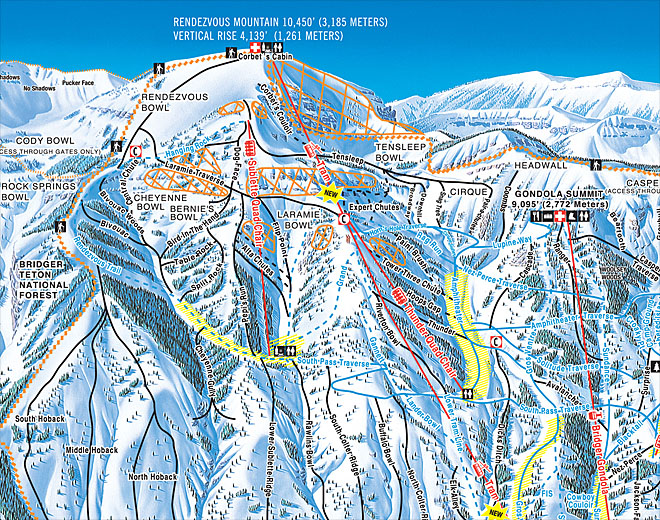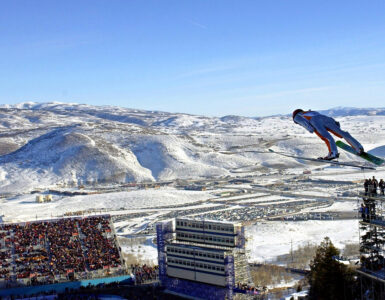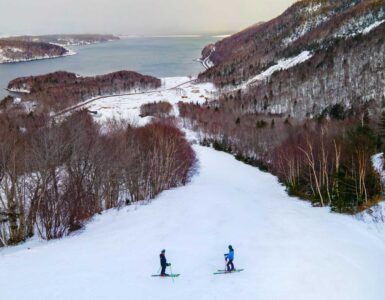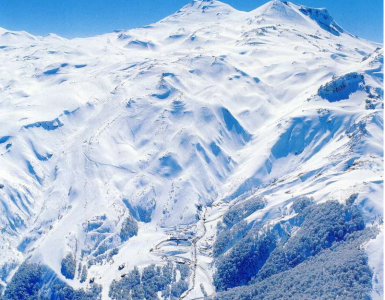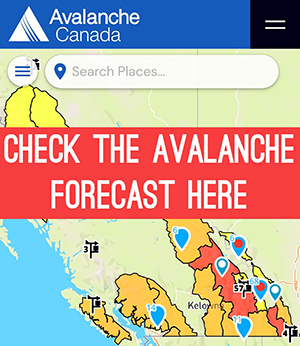by steve casimiro
Both incidents are tragic. In December 2007, Jason Coles missed a turn on an intermediate run at The Canyons ski resort in Utah, hit a tree, and was killed. One year later, at Jackson Hole Mountain Resort, David Nodine was caught in an in-bounds avalanche, buried and died. Now, in both cases, their survivors are suing the ski resorts and claiming negligence.
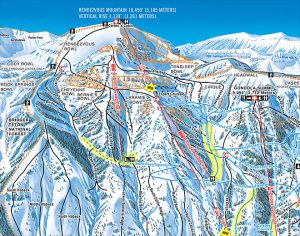
Nodine’s widow Christine is seeking an unspecified amount in Wyoming state courts after her suit was rejected by a federal judge for lacking jurisdiction. She argues that Jackson Hole failed to put into place an appropriately safe avalanche plan and that it didn’t warn skiers of slide risks the day her husband was killed.
Wyoming’s Recreation Safety Act shields purveyors of risky activities from some claims and says that ski areas (for example) aren’t required to remove or control inherent risks. Nodine’s lawsuit says that Jackson was grossly negligent by not dealing with avalanches more proactively.
“Unlike the risk of falling while skiing or being injured on a lift, an avalanche is not an inherent risk that any level of skier can assume, would be able to suspect or make an informed decision to avoid. Leaving the decision to ski or not ski an avalanche slope is not up to the skier. JHMR should have closed any area with a probable avalanche risk and kept it closed until the danger was abated,” the suit says.
On the day David Nodine was killed, a number of in-bounds slides were reported, and he wasn’t the only person caught. But snow buried him more than seven feet deep, and although patrol responded within minutes, he was unable to be resuscitated. The suit argues that despite morning control work that included throwing hard charges in Toilet Bowl, management should have done more.
“This left the Toilet Bowl run a ‘time bomb,’ which was bound to slide soon just as had other similar runs,” the lawsuit says. “Nevertheless, JHMR made the bad decision to open the run and not even provide a stern warning to skiers of the probable avalanche danger on this slope.”
Jackson Hole President Jerry Blann said, “Obviously, it’s a devastating incident. We feel our legal position is a sound one, but that doesn’t take away from the devastation of what happened.”
Nodine was a JHMR season pass holder who lived in Wilson, Wyoming. The lawsuit was initially filed in federal court, which rejected it because the season pass agreement states any redress must be sought in state courts, which is where Christine Nodine filed suit last week.
In Utah, the suit over Jason Coles’s death was also rejected by a federal judge and has not yet been refiled in state courts but is expected to be so soon. The rejection is also on appeal to the feds.
Coles was an accomplished skier who lived in Park City and frequently skied The Canyons. He owned three helmets and was wearing one the day of his death, so clearly was aware of the dangers of skiing. He was skiing with friends that day, but became separated. When he didn’t turn up, a search was initiated and his body was found in the woods near Lower Crowning Glory, an intermediate run. An autopsy showed he died of injuries consistent with a collision.
The lawsuit filed by his wife, Laurie Seal-Coles, says, “The unmarked, merging trails, sharp turn and drop-off without warning signs, roping or fencing caused Mr. Coles to ski over the edge and collide with a tree. [The Canyons Resort] should have known that failing to warn, rope and fence off the hazardous situation could result in injury to its skiers.”
What’s interesting about the Coles case is that Utah courts have allowed lawsuits to proceed against ski areas despite a recreation act similar to Wyoming’s. Just two days after Coles’s death in an unrelated case, the Utah Supreme Court ruled that the Utah Inherent Risks of Skiing Act protects ski areas from being sued over routing dangers but does not shield them from negligence. That stems from a lawsuit against Snowbird, which was initially rejected by the courts but on appeal allowed to proceed. That case is now in arbitration and is scheduled to be decided January 21.


